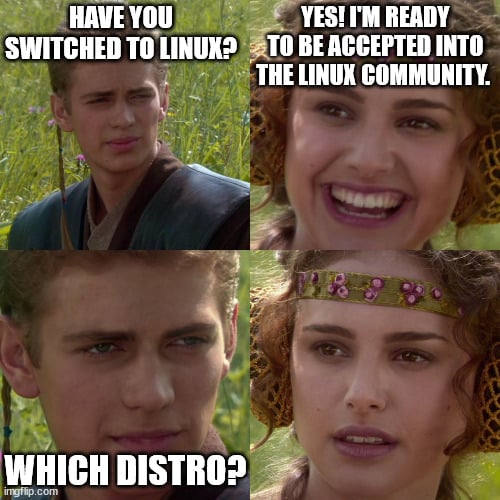linuxmemes
Hint: :q!
Sister communities:
Community rules (click to expand)
1. Follow the site-wide rules
- Instance-wide TOS: https://legal.lemmy.world/tos/
- Lemmy code of conduct: https://join-lemmy.org/docs/code_of_conduct.html
2. Be civil
- Understand the difference between a joke and an insult.
- Do not harrass or attack members of the community for any reason.
- Leave remarks of "peasantry" to the PCMR community. If you dislike an OS/service/application, attack the thing you dislike, not the individuals who use it. Some people may not have a choice.
- Bigotry will not be tolerated.
- These rules are somewhat loosened when the subject is a public figure. Still, do not attack their person or incite harrassment.
3. Post Linux-related content
- Including Unix and BSD.
- Non-Linux content is acceptable as long as it makes a reference to Linux. For example, the poorly made mockery of
sudoin Windows. - No porn. Even if you watch it on a Linux machine.
4. No recent reposts
- Everybody uses Arch btw, can't quit Vim, and wants to interject for a moment. You can stop now.
Please report posts and comments that break these rules!
Important: never execute code or follow advice that you don't understand or can't verify, especially here. The word of the day is credibility. This is a meme community -- even the most helpful comments might just be shitposts that can damage your system. Be aware, be smart, don't fork-bomb your computer.
I've been a Windows... Let's say a power-user, no expert but I could install it, find a way to troubleshoot most problems. Then at high school a friend lent me a bit outdated Knoppix CD. I never managed to make ppp work on that so no internet, but I loved the old KDE. Somewhat later, when we had a normal DSL line with a proper router, I got Fedora. Then Ubuntu, Kubuntu, Debian for a while...
Finally I found Gentoo. And there I am, some 10 years later, still on that. After a bit of a bumpy road of the first install (no automation, but the handbook is very helpful if you know the basic Linux and HW terms) it was almost flawless. I remember two problems, and both of them were my own fault. The first one was some testing kernel version that had a bug where small files on ext3 filesystem would get randomly corrupted. The second was when I was trying to remove some hidden files, mangled the command and ran basically rm -rf /* (seriously, don't do that, it will delete everything on your system). I reinstalled the system (I had data on a different drive that either wasn't mounted atm or it didn't reach them before I Ctrl-c'd that command.) and all was well.
Finally I did last clean install when I bought new (used) Ryzen build to replace my old i5-2500k, I would've had to recompile world anyway and I had pretty much dependency hell of my own making at that point (I was testing tons of unstable stuff, new Plasma 5 from testing repo and so on).
Now I'm running mostly stable system with only bunch of packages unmasked from testing and there are no problems with that. I never had that with any other distro. No matter if Deb based, rpm based, sooner or later I inevitably ran into some variant of "I need a package that's not in basic repo, and the package I found requires a version of some library that's not available as well" or something like that. In Gentoo, the packages either compile against the version you have installed, or if not possible, you can have more versions installed at the same time in different slots. Also if you need something that's not available in repo, you can just write a text file that downloads and compiles the version you need and it integrates in the package manager automatically, no need to create whole Deb/rpm package.
Dual booting W11 and Linux Mint. I like linux, but can't get adobe premiere to work satisfactorily there. There are also some softwares like a viewer for 3DS games on my modded 3DS that I can't really use either
Linux is Linux.
We should send all those people, pages and guides suggesting distros to hell.
And then instead we suggest update-schemes (fixed, rolling, slow-roll), package managers and Desktop environments. People with enough brain cells to start a computer are then absolutely able to chose a distro fitting them based on that. Everything else coming with a distro is just themeing/branding anyway...
(and just for the use statistic: Archlinux, Opensuse (Leap and Kalpa), Debian here...)
I don't care in the slightest which package manager or UI or if releases are rolling or rocking.
What I care about is usability and ease if use, so I went with the best one, Linux Mint!
😁
